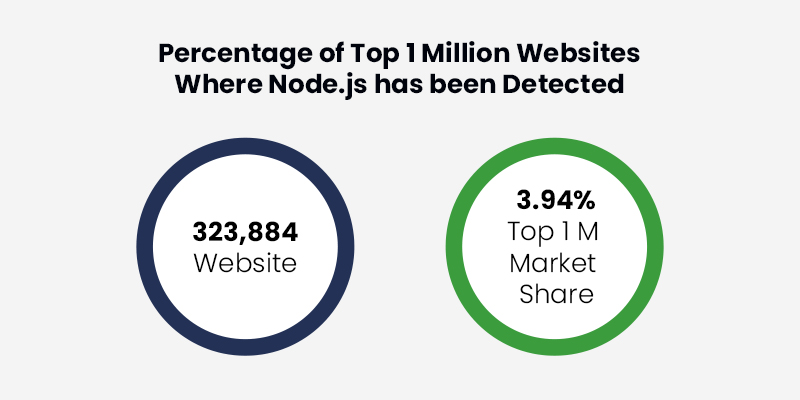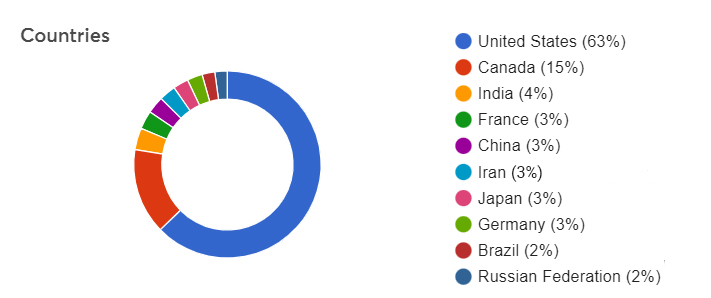
Are you a business owner looking to enhance the scalability and speed of your web application?
In today’s digital landscape, businesses constantly seek innovative ways to improve user experiences and operational efficiency. Node.js, a revolutionary technology for creating fast, scalable, and efficient web applications. Node.js is an open-source JavaScript server-side runtime environment that simplifies the development of real-time applications.
In this blog, we will explore the world of Node.js, why use Nodejs, and why it has become a game-changer for businesses. Additionally, we will provide you with our top 10 tips to hire nodeJS developers to drive your projects forward.
So let’s jump in and unlock the full potential of Node.js for your business!

What is NodeJS and Why Use It?
Based on Chrome’s V8 JavaScript engine, Node.js is a rich open-source server-side JavaScript runtime environment. Creating scalable, rapid apps enables developers to run JavaScript code on the server outside of a browser. Node.js utilizes an event-driven, non-blocking I/O architecture that handles several concurrent connections effectively. Because of this, your apps can easily run large loads and deliver flawless user experiences.
Node.js has seen considerable development in popularity in recent years due to its efficiency and usability. Because of its non-blocking I/O architecture, developers may design real-time applications like chat platforms, gaming platforms, and collaboration tools. Additionally, because of its substantial and engaged community, upgrades, security updates, and a sizable library of packages are always available, speeding up and simplifying development.
Also Read: Why Should You Choose Node JS for Your Enterprise Application?
Node.js Demographics
Node.js Websites: Global Distribution of Countries.

Node.js Websites: Global Distribution of Languages.

Key Features of Node.js

Node.js offers several key features that make it stand out as a preferred choice for modern web development:
- Asynchronous I/O – To ensure effective resource use and quick response times, Node.js uses non-blocking asynchronous I/O. This enables the execution of several processes concurrently, improving speed and responsiveness.
- Scalability – Node.js applications’ event-driven architecture supports many concurrent connections. Node.js is extremely scalable and capable of maintaining large traffic loads thanks to this feature, which enables efficient processing of simultaneous requests.
- Cross-platform Compatibility – Regarding platform compatibility, Node.js offers simplicity and versatility. It works well on various operating systems, including Windows, macOS, and Linux. The development of apps that may operate on many operating systems is made simpler because of this cross-platform capability.
- Large Package Ecosystem – The Node.js benefits from a sizable package repository accessible via npm (Node Package Manager). The process of incorporating modules from other sources into your applications is made simpler by this wide ecosystem. Developers may quickly acquire and include a variety of pre-built packages using npm, saving time and effort throughout the development process.
- Real-time Applications – Applications that demand immediate data updates and interaction are best suited for Node.js, which is very effective in these situations. Such applications include collaboration tools, gaming platforms, and chat apps. Node.js facilitates the creation of real-time functionality by enabling two-way communication between the server and the client, assuring responsiveness and a smooth user experience.
Moving ahead, let’s discuss,
Why Use NodeJS: Top Benefits of Using Node.JS for Businesses!
The advantages of using node.js for businesses are: –
 Increased Scalability and Performance
Increased Scalability and Performance
Node.JS can handle several concurrent connections without consuming many resources because it employs an event-driven, non-blocking I/O architecture. As a result, it is the ideal choice for creating applications that require excellent performance and scalability. Hiring Node.JS developers, businesses can easily handle thousands of concurrent requests, enhancing user experiences and accelerating response times.
 Enhanced Developer Productivity
Enhanced Developer Productivity
With Node.JS, programmers may use the same programming language (JavaScript) to construct front-end and back-end apps. As a result, mobile app development is streamlined, and the learning curve is lowered because there is no longer a need to switch between different languages and frameworks. Node.JS also offers a sizable ecosystem of modules and libraries, enabling programmers to utilize the available resources and equipment better while building apps.
 Real-time Application Development
Real-time Application Development
Node.JS is excellent at creating real-time applications, including chat applications, teamwork programs, and live streaming platforms. Developers will be able to create two-way communication channels between the server and the client thanks to the platform’s event-driven design and WebSocket support. This makes developing interactive and dynamic apps that instantly send data to clients and produce interesting user experiences easier.
 Simple Front-end Technology Integration
Simple Front-end Technology Integration
As Node.JS utilizes JavaScript on both the front-end and back-end, it can communicate with popular front-end frameworks like React, Angular, and Vue.js without issues. The application architecture is unified and efficient due to the fast data synchronization and enhanced client-server communication made possible by this close integration.
 Cost Savings
Cost Savings
Node.JS’s capacity to manage several concurrent connections while using fewer resources can help organizations save money. Companies can lower their infrastructure expenses by using fewer servers or cloud instances. Additionally, Node.JS’s improved developer productivity and code reuse lead to a quicker time to market, substantially reducing development expenses.
 Community Support and Vibrant Ecosystem
Community Support and Vibrant Ecosystem
The Node.JS community is dynamic and lively, and many open-source modules and packages are available. These community-driven resources give developers access to many best practices, tools, and solutions, enabling quicker development cycles. Node.JS stays current with the newest trends and developments in web development because of the robust community support.
 Easy Deployment and Scalable Hosting
Easy Deployment and Scalable Hosting
Applications built using Node.JS may be quickly deployed across various cloud service providers and platforms. With the help of services like Heroku, AWS, and Azure that provide easy deployment choices, companies can easily scale their apps as their user base expands. Businesses may install and maintain their apps with the least configuration and maintenance effort thanks to the availability of hosting providers that are particularly suited for Node.JS.
 Reliable and Stable
Reliable and Stable
Node.JS is backed by a robust technology stack, with its core being built on the V8 JavaScript engine. This engine powers some of the most widely used web browsers and ensures the stability and reliability of Node.JS applications. The maturity of the technology and the continuous improvements in the Node.JS ecosystem make it a dependable choice for businesses seeking stable and efficient solutions.
Moving ahead, let’s discuss,
Use Cases of Node.js
Node.js finds applications in various industries and domains. Following are some use cases:
- Real-time Applications – Node.js is ideal for creating real-time applications such as chat platforms, collaboration tools, and online gaming environments that need immediate data synchronization.
- Streaming Applications – As Node.js is so good at managing streaming data, it’s perfect for creating video streaming platforms, live scoreboards, stock tickers, etc.
- Microservices Architecture – Node.js is a great option for creating microservices-based architectures because its lightweight and modular approach enables enterprises to develop scalable and adaptable systems.
- Development of APIs – Node.js makes creating dependable and scalable APIs easier, enabling smooth interaction between various systems and services.
- IoT Applications – Node.js is particularly suited for creating IoT (Internet of Things) applications because of its small footprint and non-blocking design, facilitating effective device connectivity.
Moving ahead, let’s discuss,
How to Hire NodeJS Developers?
As that we understand the benefits of using Node.JS let’s explore how to hire dedicated developers who can create special applications for your business.
 Define Your Project Requirements Clearly
Define Your Project Requirements Clearly
Identify the criteria for your project before starting the recruiting process. Define the goals, features, and scope of your application. With this clarity, you’ll be able to find and hire NodeJS developers that are a perfect fit for your project.
 Look for Specialized Node.JS Experience
Look for Specialized Node.JS Experience
Application development using Node.JS calls for specialized knowledge. Find and hire dedicated developers that have first-hand knowledge in creating Node.JS apps. To be sure they have the expertise necessary for your project, check out similar work in their portfolio.
 Assess Problem-Solving Skills
Assess Problem-Solving Skills
Best Node.JS developers possess excellent problem-solving skills. Present candidates with real-world scenarios during the hiring process and evaluate how they approach problem-solving and debugging.
 Test for Knowledge of Key Technologies
Test for Knowledge of Key Technologies
Developers of Node.JS should be well-versed in related technologies such as Express.js, MongoDB, Socket.IO, and others. Use technical tests or coding challenges to gauge their knowledge and skill in these areas.
 Review Previous Projects and Code Quality
Review Previous Projects and Code Quality
Ask applicants to share their prior work so that you may assess the quality of their code. A developer that writes organized, tidy code comes off as professional and uses best practices.
 Check Communication and Collaboration Skills
Check Communication and Collaboration Skills
Effective communication and teamwork are crucial for a project to be executed successfully. Examine the candidate’s ability to work well in a team atmosphere and communicate well.
 Consider Remote Developers and Freelancers
Consider Remote Developers and Freelancers
Consider hiring freelancers or remote developers because Node.JS developers are available everywhere or partner-up with staff augmentation services. Your skill pool may grow thanks to this flexibility, resulting in cost savings.
 Seek Recommendations and Referrals
Seek Recommendations and Referrals
Contact your professional network and seek recommendations or referrals for top Node.JS developers. Personal recommendations often lead to reliable and talented individuals who may not actively search for job opportunities.
 Conduct In-Depth Interviews
Conduct In-Depth Interviews
Once you shortlist potential candidates, conduct in-depth interviews to assess their technical knowledge, problem-solving abilities, cultural fit, and long-term commitment to your project.
 Collaborate on a Trial Project
Collaborate on a Trial Project
To further evaluate a developer’s skills and suitability, consider collaborating on a trial project. This trial period allows you to gauge their performance and compatibility before deciding.
Read More: How to Hire a Node JS Developer?
Conclusion
When it comes to web app development, flexibly, and effectively, Node.JS has changed the game. It is a top option for companies of all sizes due to its speed, scalability, language consistency, broad package ecosystem, and active community support. You may find and hire Node.JS developers who will make a substantial contribution to the success of your project by using the top ten suggestions provided above. Make use of Node.JS’s strength to expand the potential of your company right away.










 Define Your Project Requirements Clearly
Define Your Project Requirements Clearly Look for Specialized Node.JS Experience
Look for Specialized Node.JS Experience Assess Problem-Solving Skills
Assess Problem-Solving Skills Test for Knowledge of Key Technologies
Test for Knowledge of Key Technologies Review Previous Projects and Code Quality
Review Previous Projects and Code Quality Check Communication and Collaboration Skills
Check Communication and Collaboration Skills Consider Remote Developers and Freelancers
Consider Remote Developers and Freelancers Seek Recommendations and Referrals
Seek Recommendations and Referrals Conduct In-Depth Interviews
Conduct In-Depth Interviews Collaborate on a Trial Project
Collaborate on a Trial Project

